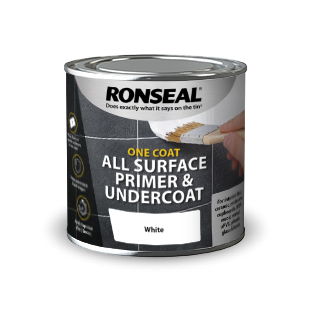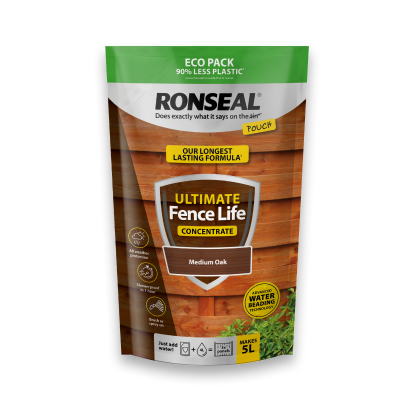One Coat All Surface Primer and Undercoat

Works on just about any surface including metal, tiles, brick, stone, MDF, plastic, glass and more. You only need one coat of this primer for your paint to adhere to it and leave you with a strong and smooth finish.
- Makes preparation a breeze
- Also available as a quick dry aerosol to really cut down on prep time
- Ready to paint over in two hours
- Suitable for bare of previously painted surfaces
- Covers bold colours
- Preps bare or painted surfaces in one coat
- Helps paint stick & last longer
- Apply top coat after 2 hours
Allow us to use your location
To access tailored content on this page, enable location cookies. Review your cookie preferences and ensure statistical cookies are enabled for the best experience.
Buy Online

How much paint do I need?
Measure your area precisely, drop the numbers into this smart calculator and it will tell you straight away how many litres you'll need to complete your project.
-
All interior surfaces

Need to know
Ideal for difficult surfaces, our primer makes quick work of a beautiful final finish. Watch our video to find out how to apply it.
Watch videoThis primer and undercoat cuts prep time in half, but you still need to clean the surface and repair any spots of damage.
One coat for great prep
Paints up to 16m2
Brush on
Almost any surface
How to use
How to use
This can be painted on almost any bare or painted indoor surface but you’ll still need to do a small amount of prep before you can apply it.
How to prepare bare wood for priming
- Use 120 grit sandpaper and sand in the direction of the wood grain.
- Wipe down the dust with white spirit and a cloth.
- Fill in holes and cracks.
How to prepare tiles for priming
- Clean the tiles with bleach.
- Use grout cleaner to get rid of stains.
- Wipe down with a damp cloth
- Repair any damaged grout
How prepare cupboards for priming
- Grab some 120 grit sandpaper and give your cupboards and good sanding.
- Let the dust settle and then wipe it off with white spirit and a cloth.
- Any small cracks or holes should be filled in.
How to prepare metal for priming
This isn’t suitable to use over rust.
- Lightly sand with fine wet and dry sandpaper. If you’re painting galvanised metal, you don’t need to sand it.
- Wipe down the sand shavings with white spirit and a cloth.
How to prepare uPVC for priming
- Just lightly sand with 120 grit sandpaper.
- Wipe down with a damp cloth.
How to prepare previously painted surfaces for priming
- Paint that’s in a good condition only needs a quick sand.
- Paint that’s peeling, flaking or cracked should be sanded off. Once you’ve done that, wipe down with white spirit.
Application
- Stir the tin
- Apply the primer. If you’re painting wood, paint in the direction of the grain.
- Wait two hours and that’s it! It’s now ready to paint over.
Aftercare
This product it just a primer and should be painted on quickly after it’s dried.
Cleaning
You can clean your brushes in warm soapy water. Once you’ve painted over the primer, you’ll be able to clean the surface just like normal.
Repair
If you spot a bit of damage to your primer, don’t worry it’s easy to fix. Sand down the specific spot and then reapply a coat of primer.
Technical Specification
| Usage |
Most interior surfaces – tiles, ceramic, melamine, cupboards, MDF, wood, metal, uPVC, plastic, glass & brick. Don’t use on stainless steel, brass, rusty metal, floors or |
| Coverage |
250ml - This tin will cover 3.5m2 750ml - This tin will cover 10.5m2 2.5L - This tin will cover 35m2 |
| Dry time | Touch dry in 30 minutes, paint over in 2 hours |
| Coat time | No need! |
| Number of coats | One |
| Colours | White |
| Finish | Matt |
| Durability |
Works on almost any surface and helps paint stick |
| Application | Brush |
| Base | Water |
| Sizes | 250ml, 750ml, 2.5L |
How to guides
Easy to follow steps to help you do a professional job on any DIY project.Find the right product
Tell us about your DIY project and we’ll show you which products you need.






